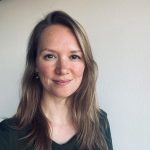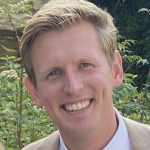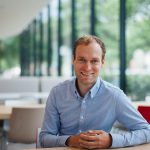Kettingbrief
Verhaallijn 1 01-09-2022
Editie 3 | jaargang 10
What has your career been like so far?
Dynamic! I started as a strategy consultant at Roland Berger because I wanted to understand companies broader than operations only. That has been a truly steep learning curve, where I saw many different types of projects and industries. It was a great start of my career, as it has given me experiences, knowledge, and skills that I don’t think you will find in many other jobs. At some point I specialized in strategy development for food ingredient companies and from that I took a leap towards the industry itself: I am currently a strategic project manager at DSM in Delft, where I most recently led the transformation/integration of 3 separate business units into the new business group DSM Food & Beverage.
Why did you choose the industry you work in now?
I am very passionate about food and innovation, as I see our current food system as one of the key challenges to solve in this century. The majority of the innovations that you see in your daily food and beverages actually do not come from the names on the package, but from the companies supplying the ingredients. I find it fascinating to see all the steps that are taken in the industry and by DSM specifically, and it is great to be part of an organization that is actively rethinking our food systems to become healthier and more sustainable.
How do your expectations about your career during your student days differ from today?
Well, I am not really one to make long-term plans (I only figured out I wanted to move into consulting about 2 months prior to graduating), so I also had little clear-cut expectations. Maybe the largest difference is about how “makeable” your job is, it is definitely not only about the predefined job title or role but much more about your own initiative to create the job that fits with you – within boundaries of course 😉
What is the key thing that you have learned during your studies that you use a lot and appreciate?
Critical thinking & creative problem-solving. I vividly remember those exams or assignments (typically logistics related) that you could not really prepare for, as there were always new questions that pushed you to think outside the box and combine all the knowledge you had to come to an answer.
What advice would you give current students?
Be curious and just do it! I have done a lot of things throughout my studies and career that I was unsure of or nervous about at first, but in the end, those were the instances where I personally grew the most. So especially when you are in doubt about something, just say yes and see what comes your way. The worst that can happen is that you learned something, the best is that it opens up a whole new world of opportunities.
You can change a question, which one would you change and why?
Old question:
How do your expectations about your career during your student days differ from today?
New question:
Where do you get most energy from inside and outside of your work?
Why:
Currently all questions are related to the career path, for me it is also interesting to learn more about the person behind the job title.







